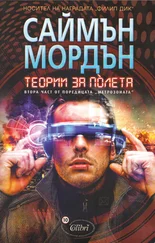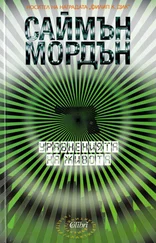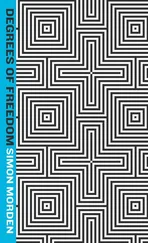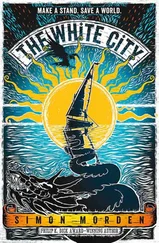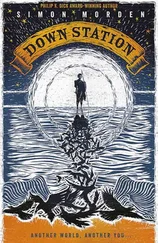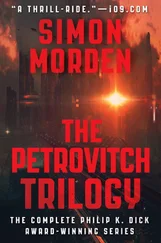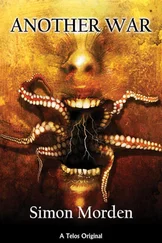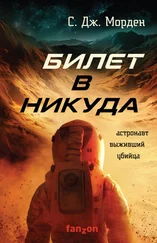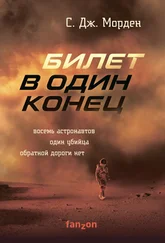Chain shook his head. “Are you going to tell me what all this is about?”
“No. You’ll have to see it for yourself.”
“Maybe you should’ve let me see it before you started screwing about.” The lights cycled to red without them moving. “Can this get any worse?”
The first raindrop left a dusty circle on the windscreen. It was there long enough to ball and run down the glass to the bottom before the clouds opened and rain drummed against the roof.
“Clearly it can,” said Petrovitch. The car in front edged forward half a length, and Chain claimed the space as his own.
The rain continued to blatter down, hard enough to make it seem like there was boiling water rising from the ground. The pedestrians either took shelter where they could, or hunched their shoulders and accepted the indignity.
Chain put his wipers on, smearing the grit and grease in two arcs. “I can remember when rain—any rain—meant danger. Everyone would listen to the weather forecasts and sirens would sound in the streets.”
“Yeah, pretty much the same,” said Petrovitch. “Except we didn’t have satellites or sirens. We just got wet and took iodine pills when we could.”
“This isn’t meant to be a game of ‘my life was worse than yours,’ you know. And your country never got bombed.”
“All we had to put up with was your fall-out; nuclear and economic. You had food relief; we didn’t. You had rebuilding projects; we didn’t. You had someone to blame; trivial, really, but we didn’t. Everyone looked after poor Europe, and we were left swinging in the wind.”
“Surprising,” said Chain, gazing out at the traffic lights as they went from amber to green, “how much damage a handful of madmen can do. Why aren’t we going anywhere?”
“You want to get out and walk? Or do you want to shut up?”
Chain sighed and scrubbed at his cheeks with his hands. They sat in silence, watching the rain fall.
“You heard from Sorenson?” asked Chain.
“Not since I warned him he might have carried your bug into the heart of Oshicora’s operations.”
Chain pulled a face. “Did I tell you about his father?”
“What about his father?”
“His old man was political—Reconstruction to the core—assassinated six, seven years ago. Case is still open. All the fingers pointed at Junior, but no one could pin it on him. Apparently, sniping’s not his style. Explosives are, though.” Chain leaned forward and set the wipers to double-time. Despite the deluge, people were getting out of their cars and walking toward the front of the queue. “What? What are they doing?”
Petrovitch reached behind him for his blanket. “There’s only one way to find out.” He pulled the material over his head again and opened the car door. The rain poured in, and within seconds he was soaked.
Chain turned up his collar and joined him—making sure to lock the car behind him. The crowd was uncharacteristically quiet; hushed enough to hear the soft roar of the rain, the scrape of boots on tarmac.
As they walked forward through the stalled lines of vehicles, they could see a line forming across the junction, deepening as more people joined it. Chain used his badge and his elbows to work his way to the front, and Petrovitch tucked in behind.
When they got there, they found the cross-wise street devoid of traffic: on the other side of the junction was a similar mass of onlookers. The lights were red in every direction.
“That’s not right,” said Chain.
Petrovitch tapped him on the shoulder and pointed. “Neither is that.”
A solid phalanx of cars was crawling down Gloucester Place in the direction of the river. Every lane was taken up, four abreast, rolling slowly in a perfect line. Chain was about to step out and demand an explanation when Petrovitch touched his shoulder again.
“Don’t.”
There were people in the cars. From the frantic banging on the inside of the windows and the rattle of door handles, they didn’t seem too pleased to be there. Some of the drivers were screaming into their phones, and some of them were just screaming. They pulled at their steering wheels, dragged at the handbrakes, all to no avail.
They drove inexorably on.
The front of the procession drew level with them. Chain tried the door from the outside. It was locked, but neither could the wild-haired woman inside get it open.
“What are you doing?” he yelled at her.
“Help me,” she mouthed.
“Chain?”
“Not now, Petrovitch.” He pulled his gun and reversed it in his hand.
“This is important! All these cars, all of them: they’re new.”
“What?” Chain kept pace with the car and readied himself. He shooed the woman away from the passenger door and imitated what he was going to do.
“They’re all this year’s or last year’s models; top of the range.”
“You’re not making any sense.” The rain had penetrated everywhere; everything was wet, clinging, dripping.
“They’re all automatic. They drive themselves, Chain.”
Chain brought the butt of his gun down against the window. It bounced off with the same force, and he let out a strangled cry of pain.
“That’ll be toughened glass, then,” said Petrovitch. “Let’s try this instead.”
He stepped around the front of the car and took his bug-detecting wand from around his neck. He ran it up one side of the bonnet, then the other. At the top, on the driver’s side, he got a signal.
He reached into his waistband and dragged out his snub-nosed little pistol. He pointed it down at the metalwork and pumped the trigger, once, twice, three times. Three sharp whipcracks; three holes.
The car stalled. The doors unlocked with a clunk. On hearing the sound, the driver threw herself at the passenger door, and Chain hauled her out.
The rest of the cars carried on. The car behind nudged the back of the disabled one, and started to shove it forward. Petrovitch skipped out of the way and stood in the torrent in the gutter as the grind of metal and the faint pattering of desperate hands on glass made its stately way down the street.
Thirty cars in all, no traffic in front, none behind. The crowd began to murmur and disperse, the show over.
Chain was struggling with his bruised gun-hand and the woman. She gasped and mouthed, and no words would come out. All the while, she grabbed at parts of his jacket to be reassured that he was real.
“Petrovitch? What did you do?”
“I killed it.” Petrovitch worked the slide and ejected the chambered shell into his hand. He tucked his gun away again.
“Explain. Excuse me, miss. Will you stop pawing at me?” He finally got his good arm up and held her away.
“I blew its brains out. Even your car’s not so old that it hasn’t got electronics under the bonnet.” Petrovitch took his glasses off and shook them free of water. “That’s what you’re going to have to do to each and every one of them.”
“Me?”
“You and your cop friends. Unless you’re happy for this to carry on?”
The broken car beached itself against a lamp-post further up the street. The obstacle it made caused ripples in the neat lines of cars, so that the advancing front was no longer perfectly straight.
Chain looked at the woman, who had started to wander away in a daze. She walked slowly and erratically toward her car, and when she was within range, she started to kick viciously at it with her heels.
“Is this your fault?” asked Chain.
“No more than it is the Oshicora Corporation’s. Which is to say, I don’t know.” He put his glasses back on, fat raindrops clinging to the lenses. “But I don’t see how it can be.”
“I’m going to have to call this in. I’m going to have to get help.” Chain flexed his fingers to check they all still worked. “Don’t think you’re off the hook.”
Читать дальше
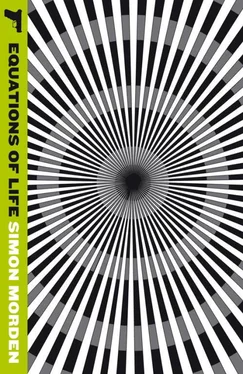
![Саймон Морден - Билет в никуда [litres]](/books/388091/sajmon-morden-bilet-v-nikuda-litres-thumb.webp)
![Саймон Морден - Билет в один конец [litres]](/books/395533/sajmon-morden-bilet-v-odin-konec-litres-thumb.webp)

